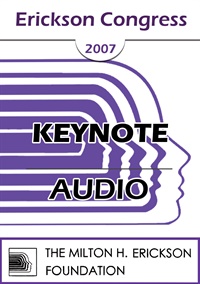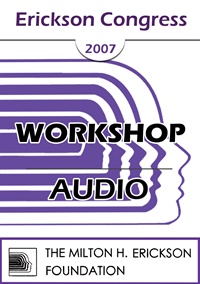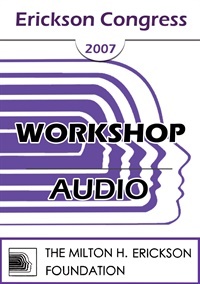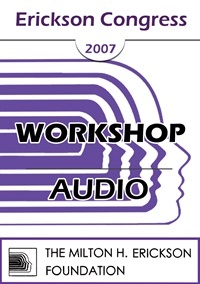
- Average Rating:
- Not yet rated
- Topic Areas:
- Keynotes | Hypnosis | Psychotherapy
- Categories:
- Erickson Congress | Erickson Congress 2007
- Faculty:
- Jeffrey Zeig, PhD
- Duration:
- 1:13:22
- Format:
- Audio Only
- Original Program Date:
- Dec 08, 2007
- Short Description:
- This tribute is a retrospective look at the contributions that Jay Haley made to both psychotherapy and hypnosis.
- Price:
- $15.00 - Base Price

- Average Rating:
- Not yet rated
- Topic Areas:
- Workshops | Mind-Body | Neuroscience | Therapist Development | Psychotherapy
- Categories:
- Erickson Congress | Erickson Congress 2007
- Faculty:
- Ernest Rossi, PhD | Kathryn Rossi, PhD
- Duration:
- 1:54:32
- Format:
- Audio Only
- Original Program Date:
- Dec 06, 2007
- Short Description:
- Let’s rework and reframe natural life transitions as positive. Disease models have no place in natural processes. Explore these aspects of change on the deepest levels of gene expression and brain plasticity during mind-body communication and healing in psychotherapy. Let’s explore how we can optimize our lives in an age of unprecedented scientific advances.
- Price:
- $15.00 - Base Price

- Average Rating:
- Not yet rated
- Topic Areas:
- Short Courses | Belief Systems | Mind-Body | Multicultural | Psychotherapy
- Categories:
- Erickson Congress | Erickson Congress 2007
- Faculty:
- Jeanne Hernandez
- Duration:
- 1:19:28
- Format:
- Audio Only
- Original Program Date:
- Dec 07, 2007
- Short Description:
- This workshop explores how the Native American belief system contains ingredients to keep the mind and body in harmony and promote well-being. We will explore adding time-frames, respect and gratitude; the circle of life, and symbols as reminders of the "right" path.
- Price:
- $15.00 - Base Price

- Average Rating:
- Not yet rated
- Topic Areas:
- Short Courses | Children and Adolescent Therapy | Ericksonian Hypnosis and Therapy Techniques | Ericksonian Psychotherapy | Psychotherapy | Utilization | Tailoring
- Categories:
- Erickson Congress | Erickson Congress 2007
- Faculty:
- Maria Escalante de Smith, MA
- Duration:
- 1:18:55
- Format:
- Audio Only
- Original Program Date:
- Dec 07, 2007
- Short Description:
- Ericksonian psychotherapy emphasizes the utilization of our resources. When I treat children with enuresis, I focus on resources and keep in mind that Ericksonian interventions should be brief because children may get tired of being in therapy for too long. Techniques tailored to a child and examples of inductions such as eye fixation utilizing toys will be presented. I will emphasize how to make several brief interventions quickly while utilizing "non human co-therapists" during home assignments, and the combination of conversational trance with tasks.
- Price:
- $15.00 - Base Price

- Average Rating:
- Not yet rated
- Topic Areas:
- Short Courses | Ericksonian Hypnosis and Therapy Techniques | Trauma | Brief Therapy | Thought Field Therapy | Psychotherapy
- Categories:
- Erickson Congress | Erickson Congress 2007
- Faculty:
- Suzanne M. Connolly, MSW, CISW
- Duration:
- 1:19:13
- Format:
- Audio Only
- Original Program Date:
- Dec 07, 2007
- Short Description:
- Attendees will be introduced to Ericksonian interventions and Thought Field Therapy interventions. They have been successfully utilized by the presenter to treat the symptoms of trauma in clinical settings, in the field (Rwanda and other African countries) and in large group settings (Charity Hospital and other new Orleans institutions.)
- Price:
- $15.00 - Base Price

- Average Rating:
- Not yet rated
- Topic Areas:
- Short Courses | Mind-Body | Neuroscience | Psychotherapy
- Categories:
- Erickson Congress | Erickson Congress 2007
- Faculty:
- Bruce Gregory, PhD
- Duration:
- 1:19:20
- Format:
- Audio Only
- Original Program Date:
- Dec 07, 2007
- Short Description:
- Over the past 20 years, Dr. Rossi has innovatively expanded Ericksonian work by demonstrating its connection to molecular biology, chronobiology, chaos theory and mathematics. This course will explore the relationship and relevance of Dr. Rossi's mind-body work to other forms of psychotherapy. We will learn how mind-body work utilizes and integrates many of the core processes used in the work of Winnecott, Klein, Masterson, Kohut, Jung and cognitive behavioral therapy.
- Price:
- $15.00 - Base Price

- Average Rating:
- Not yet rated
- Topic Areas:
- Short Courses | Ericksonian Hypnosis and Therapy Techniques | Ericksonian Psychotherapy | Hypnosis | Psychotherapy
- Categories:
- Erickson Congress | Erickson Congress 2007
- Faculty:
- Harvey Wasserman, MD | Sarah Daniel, MED | Michael Mullally, MA
- Duration:
- 1:14:57
- Format:
- Audio Only
- Original Program Date:
- Dec 07, 2007
- Short Description:
- Homeopathic remedies can be comfortably and effectively used as an adjunct to Ericksonian hypnosis and psychotherapy. When a correct match is found between the client's emotional and psychological state and the remedy is offered, the client frequently enters an altered state of consciousness or trance which facilitates profound and lasting change. Dr. Wasserman will demonstrate his trance-following technique induced by deeply resonant homeopathic remedies, and will introduce the use of remedies through live demonstrations and clinical examples.
- Price:
- $15.00 - Base Price

- Average Rating:
- Not yet rated
- Topic Areas:
- Workshops | Children and Adolescent Therapy | Psychotherapy | Anxiety | Hypnosis | Post-Traumatic Stress Disorder (PTSD) | Self-Esteem
- Categories:
- Erickson Congress | Erickson Congress 2007
- Faculty:
- Susy Signer-Fischer, Lic. Phil. Psych
- Duration:
- 1:53:27
- Format:
- Audio Only
- Original Program Date:
- Dec 07, 2007
- Short Description:
- Self-esteem, self-confidence and self-concept are closely connected with the development of human identity. The enhancement of self-esteem and identity formation can be used effectively in psychotherapy with children, especially in the treatment of anxiety disorders, depression, post-traumatic stress disorder and many other social difficulties. Hypnotic interventions proved to be effective in working with children and adolescents on an individual basis.
- Price:
- $15.00 - Base Price
Tags: Anxiety Hypnosis PTSD Self-Esteem

- Average Rating:
- Not yet rated
- Topic Areas:
- Workshops | Meditation, Spirituality and Yoga | Psychotherapy
- Categories:
- Erickson Congress | Erickson Congress 2007
- Faculty:
- Rubin Battino, MS
- Duration:
- 1:56:32
- Format:
- Audio Only
- Original Program Date:
- Dec 09, 2007
- Short Description:
- The systematics of using guided imagery (GI) for psychotherapy and/or healing will be presented, along with the rationale for each component. Using a volunteer, the attendees will participate in creating a GI; then the presenter will carry out what they have designed. If time permits, attendees will experience a generic group GI.
- Price:
- $15.00 - Base Price

- Average Rating:
- Not yet rated
- Topic Areas:
- Workshops | Hypnosis | Psychology | Psychotherapy | Strategic Therapy
- Categories:
- Erickson Congress | Erickson Congress 2007
- Faculty:
- John Beahrs, MD
- Duration:
- 1:53:36
- Format:
- Audio Only
- Original Program Date:
- Dec 09, 2007
- Short Description:
- Many strategic therapists eschew theory and sacrifice grounding. Missing theory resides in basic sciences. Hypnosis data reveal consciousness and volition as paradoxes, resolvable through evolutionary biology. Human's minds evolved as shared self-deceptions. Theory can predict transference, paradox, game antitheses, Erickson's "common sense psychology," but it constrains their optimum utilization.
- Price:
- $15.00 - Base Price
Please wait ...

